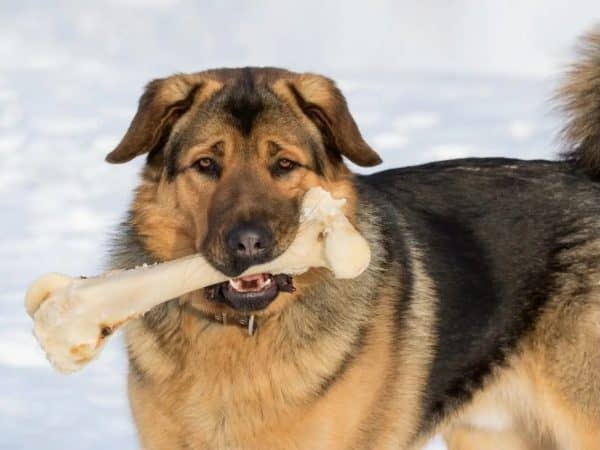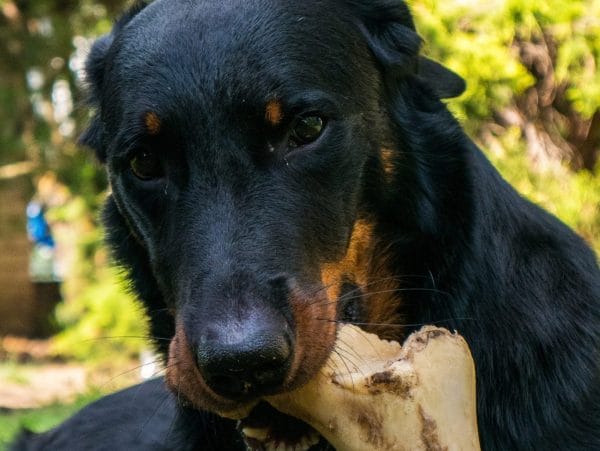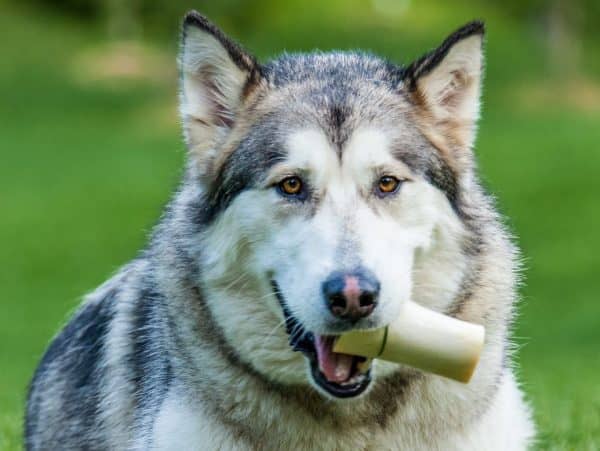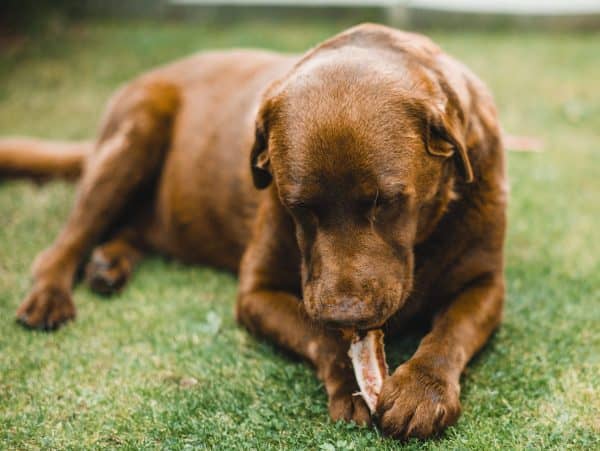This post is also available in:
Français (French)
Español (Spanish)
It’s a dog-eat-dog world out there, and every responsible pet owner wants to keep their furry friend happy and healthy.
One way to achieve this is through providing them with chew toys, such as dog chew bones.
Not only do these toys provide entertainment for dogs, but they also offer several benefits that can improve their overall well-being. Dog bones can help clean teeth and promote healthy gums by removing plaque and tartar buildup. They also provide mental stimulation which can prevent boredom and destructive behavior in dogs.
However, not all dog bones are created equal, so it’s essential to choose the right one for your pup’s size, age, and chewing habits. In this article, we will explore the different types of dog bones available on the market, how to choose the right one for your pet and potential risks associated with using them. We will also discuss other chew toy alternatives that may be suitable for your furry friend’s needs.
Key Takeaways
- When choosing a dog bone, size, weight, and chewing habits should be considered, along with nutritional value and safety features such as choking hazard and digestive issues.
- Dental health benefits include scraping away tartar and plaque, strengthening jaw muscles, and mental stimulation, but there are potential risks such as fractured teeth.
- Alternatives to traditional dog bones include rope toys, rubber toys, edible chews, and puzzle toys, knuckle bones which challenge the mind and jaws.
- Regular dental cleanings/check-ups and avoiding bones that are too hard or small can help prevent dental problems, which can be costly to treat. Your veterinarian can help determine the best course of action for your dog’s dental health.
Benefits of Dog Bones
You’ll love giving your furry friend dog bones because they provide numerous health benefits. Chewing on a bone helps to promote dental health by scraping away tartar and plaque buildup, which can lead to bad breath and tooth decay. Additionally, chewing on a bone also strengthens their jaw muscles, helping them maintain healthy teeth for years to come.
But the benefits of dog bones don’t stop there! Chewing on a bone can also provide training benefits for your pup. Giving them a designated chew toy teaches them what’s acceptable to chew on, preventing destructive behavior in the future. Furthermore, chewing on a bone can help alleviate boredom or anxiety, providing mental stimulation and keeping them occupied while you’re away from home.
Overall, dog bones are an excellent addition to any pup’s diet plan!
Types of Dog Bones
There are various types of chews that your furry friend will love to gnaw on. When it comes to dog bones, there are two main categories: rawhide and antlers.
Rawhide is made from the inner layer of cow or horse hides, while antlers come from deer or elk. Although both options can provide great dental benefits for dogs, they have their differences.
Rawhide bones tend to be softer and easier to chew than antlers, making them a good option for puppies or older dogs with weaker teeth. They also come in flavored and unflavored varieties, which can add an extra level of enjoyment for your pup.
However, some pet owners may prefer to avoid rawhide due to potential choking hazards or digestive issues if not properly chewed and digested. Antler bones are harder and longer-lasting than rawhide, but they do not contain any added flavors.
Ultimately, the choice between rawhide and antler bones depends on your dog’s individual needs and preferences.
Choosing the Right Dog Bone
When choosing the right dog bone, size and weight are important factors to consider. The bone should be appropriate for the dog’s age, size, and chewing strength. Understanding the dog’s chewing habits is also crucial in selecting a bone that will keep them entertained and satisfied.
Additionally, pet owners should take into account the ingredients of the bone as well as safety concerns to ensure their furry friend remains healthy and happy.
Size and Weight
If you’re looking to pamper your furry friend, go for a bigger bone as they can handle the weight and size better. Weight distribution is key when choosing the right dog bone for your pet.
A larger bone will be able to distribute its weight better across your dog’s jaw, reducing the risk of any injuries. Aside from weight distribution, flavor options also play a role in choosing the right size and weight for your dog’s bone.
Bigger bones may offer more flavor options, which can make them more enticing for your pet. However, it’s important to remember that not all dogs have the same preferences when it comes to taste. It might take some experimentation before you find the perfect combination of size and flavor that your furry friend will love!
Chewing Habits
You’ll want to consider your furry friend’s chewing habits when choosing the perfect bone for them. Some dogs are aggressive chewers and require a more durable bone, while others may prefer softer bones that they can easily break down.
Here are some things to keep in mind:
-
Teething puppies: Puppies go through a teething phase where they need to chew on things to alleviate discomfort. Look for bones specifically designed for puppy teething, as they’ll be softer and gentler on their developing teeth.
-
Destructive behavior: If your dog has a tendency towards destructive chewing, it’s important to choose a bone that can withstand their strong jaws. Opt for bones made from tough materials like nylon or antlers.
In addition to these factors, you should also consider the size of the bone in relation to your dog’s mouth and overall body size. A bone that’s too small could become a choking hazard, while one that’s too large may be difficult for them to handle.
By taking all of these factors into account, you can find the perfect bone for your furry friend’s specific chewing needs.
Ingredients and Safety
To ensure your furry friend’s safety, it’s important to carefully examine the ingredients and safety features of any bone you choose. When it comes to dog bones, nutritional value is an essential factor to consider. A good quality bone should contain high-quality protein sources and essential vitamins and minerals that contribute to your dog’s overall health.
Aside from nutritional value, the manufacturing process is also crucial in determining the safety of a dog bone.
You want to make sure that the manufacturer uses safe and non-toxic materials in producing their products. Additionally, it’s best to avoid bones that are made from rawhide or other materials that can easily break off and pose a choking hazard for your pet.
By taking these factors into consideration when choosing a dog bone, you can ensure that your furry friend enjoys a healthy treat without compromising their safety.
Potential Risks
Dog bones can be a great source of entertainment and dental health for dogs, but there are potential risks to consider.
Choking hazard is one of the most significant risks associated with dog bones, as small pieces can break off and become lodged in your dog’s throat.
Digestive issues are also a possibility, as some dogs may struggle to digest certain types of bones.
Additionally, hard or overly abrasive bones can cause fractured teeth in some dogs.
Choking Hazard
Like a fish bone stuck in your throat, bones can pose a choking hazard for dogs. As much as we love to give our furry friends a treat every now and then, it’s important to be aware of the potential risks that come with giving them bones. Here are some things to keep in mind when it comes to preventing accidents related to choking hazards:
- Choose the right size: When selecting bones for your dog, make sure they’re appropriate for their size. Small dogs should have small bones, and larger dogs should have larger ones.
- Monitor your dog: It’s important to supervise your dog while they’re chewing on a bone. This will allow you to intervene if necessary and prevent any accidents from happening.
- Know when to take it away: If your dog starts breaking off small pieces of bone or seems like they’re struggling to chew on it, it may be time to take the bone away.
- Consider alternatives: There are plenty of other treats out there that don’t pose as big of a risk as bones do. Try dental chews or toys instead.
Keeping these tips in mind will not only help prevent accidents but also ensure that your furry friend stays safe and healthy.
Additionally, training tips such as teaching ‘drop it’ or ‘leave it’ commands can also come in handy if your dog ever gets their paws on something they shouldn’t have. Remember, prevention is key when it comes to keeping our pets safe!
Digestive Issues
If your furry friend is experiencing digestive issues, it’s important to pay close attention to their behavior and symptoms. Some common signs of digestive issues in dogs include vomiting, diarrhea, constipation, loss of appetite, and lethargy. These symptoms can be caused by a variety of factors such as food allergies, infections, or even stress.
To help alleviate your dog’s digestive woes, there are several steps you can take.
First and foremost, consult with your vet to rule out any underlying health conditions that may be causing the issue. They may suggest dietary changes or prescribe medications like probiotics and digestive enzymes to improve your pet’s gut health.
Additionally, make sure your furry friend stays hydrated and avoid feeding them table scraps or foods that are high in fat as this can exacerbate their symptoms. By taking these proactive steps and working closely with your vet, you can help ensure that your pup gets back on track to optimal health!
Fractured Teeth
When your furry friend fractures a tooth, you may not even realize it at first. Did you know that according to the American Veterinary Dental College, fractured teeth are one of the most common dental problems seen in dogs? Dogs can fracture their teeth for various reasons such as playing with hard objects or biting down on something they shouldn’t have. Some signs of a fractured tooth include pawing at the mouth, drooling, difficulty eating or chewing, and bad breath.
Prevention tips for fractured teeth include avoiding giving your dog bones that are too hard or small enough to be swallowed whole.
Additionally, avoid giving your dog toys that are too tough or made of materials that could cause damage to their teeth. Regular dental cleanings and check-ups at the vet can also help prevent dental problems like fractured teeth. If your furry friend does end up fracturing a tooth, treatment options may include extraction or root canal therapy depending on the severity of the fracture. It’s important to consult with your veterinarian to determine the best course of action for your beloved pet’s dental health.
Other Chew Toy Alternatives
Looking for something different than traditional dog bones? Check out these alternative chew toys! Rope toys and rubber toys are great options for dogs who love to chew. They come in a variety of shapes, sizes, and textures, allowing your furry friend to enjoy their playtime while also satisfying their urge to gnaw.
Edible chews and puzzle toys are other fantastic alternatives. Edible chews provide both entertainment and nutrition, as they’re made from ingredients that promote dental health. Puzzle toys challenge your dog’s mind as well as their jaws, requiring them to figure out how to access the treat hidden inside.
Whichever option you choose, it’s important to supervise your dog while they’re playing with any toy to ensure their safety and prevent any accidents.
Conclusion
In conclusion, while dog owners may believe that giving their furry friends bones to chew on is a natural and healthy activity, the reality is that it comes with potential risks and drawbacks.
Despite the numerous benefits of dog bones such as dental health improvement and mental stimulation, there are various types of bones to choose from which can make the decision-making process difficult. Additionally, one must also consider factors such as size, breed, and chewing habits when choosing the right bone for their pet.
Ironically enough, while dog bones may seem like a great solution for keeping your pet occupied and healthy, they can also lead to serious injuries or even death if not used properly. Therefore, it’s important for dog owners to do their research before purchasing any type of bone or chew toy for their beloved pets.
In the end, there are other alternative options available that can provide similar benefits without the potential risks associated with using bones.
“From Abandoned to Adored: Experience the Magic of BoneVoyageDogRescue!”
Frequently Asked Questions
How often should I give my dog a bone?
As a responsible pet owner, it’s important to follow bone safety tips when giving your furry friend a treat. Alternatives like chew toys can provide similar benefits without the potential risks. Consider their size and chewing habits before offering any bones.
Can puppies have bones?
Puppies can benefit from teething remedies like ice cubes or frozen carrots instead of bones, which can be too hard for their developing teeth. It’s important to supervise any chew toys to prevent choking hazards.
What is the nutritional value of dog bones?
When considering treats for dogs, it’s important to weigh the benefits and risks. Alternative treats like carrots or green beans offer similar nutritional value without the potential dangers of bones, such as choking or intestinal blockages.
How do I properly store dog bones?
Looking to store bones for your furry friend? Should you keep them in the freezer or pantry? Bones can last up to a year if stored properly. Make sure they are sealed and labeled with the date.
Are there any breeds that should not be given bones?
It’s important to note that certain breeds, such as brachycephalic dogs, are more prone to choking hazards from bones. In these cases, alternative treats should be considered for their safety and well-being.




